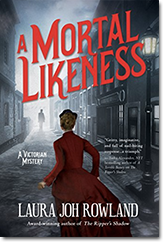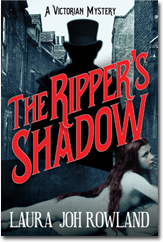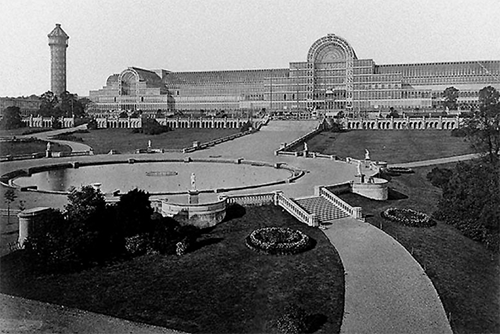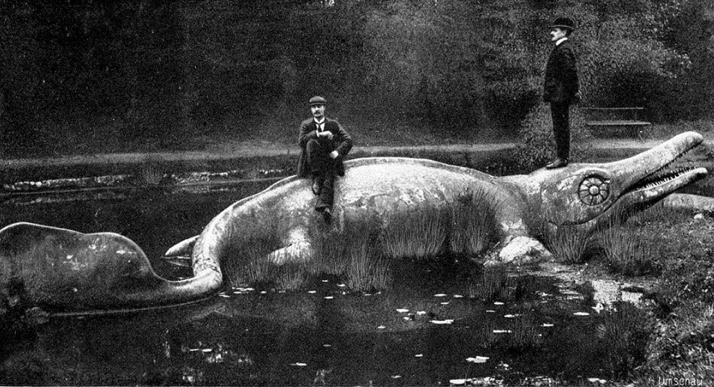|
Connect with Laura

Sign up for Laura's
newsletter
Available for preorder:

Read an excerpt


Read an excerpt








|

A photographer in 1889 London, Miss Sarah Bain runs a private detective agency with her friends, Lord Hugh Staunton and former street urchin Mick O'Reilly. Their sole credential is that they solved the Jack the Ripper case, a secret they can never tell because they did it outside the boundaries of the law. Their new big case arises when a wealthy banker, Sir Gerald Mariner, posts a handsome reward for finding his missing infant. All of London joins in the search. But Sarah has an advantage--a photograph she took during a routine surveillance job, which unexpectedly reveals a clue about the kidnapping.
After Sir Gerald hires Sarah, Hugh, and Mick to find his son, they move into his opulent mansion, where they discover a photograph of baby Robin. It eerily resembles postmortem photographs taken of deceased children posed to look as if they're alive. Was the kidnapping real, or a cover-up for a murder? Is the perpetrator a stranger, or someone inside the troubled Mariner family? The case hits close to home for Sarah as it intertwines with her search for her father, who disappeared after he became the prime suspect in a murder twenty-three years ago. She finds herself on the wrong side of the law, which threatens her budding romance with Police Constable Barrett. But Sarah must uncover the truth about Robin's kidnapping, and her own family, before her past catches up to her in A Mortal Likeness, the gripping follow-up to award-winning author Laura Joh Rowland's The Ripper's Shadow.


Chapter 1
The train thunders along the track, through rain, fog, and smoke. In my seat by the window, I fidget with the camera and leather satchel on my lap. Beside me, Hugh pages through a newspaper he's already read twice since we left Victoria Station at ten this morning. He checks his pocket watch; it's twelve-fifteen now.
"Where the devil is he going?" Hugh whispers.
We behold the man seated across the aisle two rows up. I've been staring at him for so long, I've memorized his black derby, the auburn hair curling under the brim, his gray wool coat, and the masculine curve of his jaw. "Heaven only knows."
"Heaven and the woman he's secretly meeting," Hugh says.
"The woman we hope he's meeting."
"Sarah, his wife is certain he's having an affair. A rich, elderly widow goes to a seaside resort and falls in love with a young bellhop? Of course Noel Vaughn only married her for her money and he's unfaithful."
"But we've been spying on him for two weeks, and we haven't caught him."
Five months ago, Hugh and I formed a private inquiry service. We placed advertisements in the newspapers: Experienced detectives will conduct investigations of any kind. Discreet, confidential service. Reasonable rates. Alas, all our cases have been small and the fees low. Not many people want to hire a photographer who was evicted from her studio in seedy Whitechapel or an aristocrat who'd never worked a day in his life. So far Hugh and I have found missing cats who'd taken up residence at neighbors' houses and a diamond bracelet thought stolen but actually dropped behind a bed. We were hired to lurk in a notions store and catch shop-lifters. The one major investigation that gives us the right to call ourselves "experienced" is one that we must keep secret. Mrs. Vaughn is our biggest client to date, our hope of better work later.
"We'll catch him if we stick with it long enough," Hugh says, "and we need the money."
When I was evicted from my studio, where I also lived, I couldn't afford to rent a new place. Hugh came to my rescue. He had become estranged from his wealthy, noble family when they learned that he's a homosexual. His father, the Marquis of Ravenswood, gave him an allowance and a house to live in for a year while he establishes himself in a profession, and he invited me to move in. Although it's improper for me to reside with a man I'm not married to, we're the best of friends and I've nowhere else to go. Now the year is half gone, Hugh's allowance isn't enough to support both of us, and we're unqualified for ordinary jobs. Our private inquiry service is our only hedge against a looming, uncertain future.
We contemplate Noel Vaughn. He didn't notice us when we boarded the train behind him and hasn't turned around once. If he did look in our direction, he would see a strikingly handsome blond-haired man who wears a coat, hat, and trousers suitable for a shop clerk. Vaughn wouldn't notice me. A thin, plain spinster of thirty-three, in a modest gray coat and bonnet, I'm unremarkable at best and invisible when with Hugh, who outshines everyone around him. Two young ladies across the aisle are trying to catch his eye. He is oblivious.
"We must be halfway to Antarctica," he says. The train has crossed the Thames and is now carrying us through London's southern suburbs. "Is Vaughn ever going to get off the train?"
I'm patient, accustomed to taking many pictures of customers in my studio and waiting hours in the field for the right light, but patience is not among Hugh's many virtues. He taps the front page of his newspaper. "Now this is the kind of case I'd like."
The headline reads, "Baby Robin Still Missing. Police Pursuing New Leads." Robin Mariner was kidnapped on 8 April--eleven days ago--from his family's estate on Hampstead Heath. His father is Sir Gerald Mariner, one of the wealthiest men in England, and his mother is Alexandra Lyle, the famous former actress. The picture, which has appeared in every newspaper and on posters and handbills all over town, is an engraving from a photograph of Lady Alexandra holding Robin. Her hair is an upswept mass of fair ringlets, her bosom swells the bodice of her lace-trimmed frock, and her beautiful, sensuous face wears the smile that once lit up the West End stages. Dark-haired Robin, aged twenty months and dressed in a sailor suit, blends into the shadows. His kidnapping is a national sensation that has diverted the public's attention from Jack the Ripper.
The killer known by that nickname killed six women during last August, September, and November. The police's search for him is still ongoing, his identity known to only a few persons. Hugh and I are among the fewer who know the truth about the murders and why London need fear the Ripper no longer.
"The reward's been upped to five thousand pounds," Hugh says. Sir Gerald has offered to pay for information leading to Robin's rescue and the kidnapper's capture. "We should be looking for Robin."
"Half of London already is." I too have eagerly followed the story; I've a personal interest in cases that involve missing persons. The papers report that the police are swamped with tips about sightings, none of which have panned out. The Special Kidnapping Squad, composed of officers from all the police jurisdictions, hasn't been able to pick up Robin's trail.
"We might get lucky." Hugh is more optimistic than I. It was his idea to start a private detective agency.
The train slows with a grinding sound of brakes. Through the window I glimpse a huge red-brick station topped by conical turrets. It looks unexpectedly familiar. As I try to remember when I've seen it before, the station swallows up the train, which shudders to a halt. Noel Vaughn gathers his umbrella and rises.
"It's about time," Hugh says.
Following Vaughn down the aisle, I carry my satchel and Hugh my camera, which is enclosed in a square wooden case twelve inches high. It's bulkier and heavier than my miniature camera, but it takes better photographs. Also burdened by umbrellas, we step onto the platform in the cold, smoky train shed. I didn't see the sign for the station; I don't know where we are.
As Vaughn strides through a door, Hugh whispers, "Hang back. Don't let him spot us."
We descend stairs to an underground passage. White brick pillars flare at the top into broad, circular capitals decorated with orange and white bricks in geometric patterns. My sense of familiarity is stronger, a weight in my stomach. When I was nine years old, my father began teaching me photography, taking me on expeditions to practice. This was one of the places we went. Benjamin Bain, my father, disappeared in 1866 when I was ten. He is the reason that Robin Mariner's kidnapping and other cases that involve missing persons touch a nerve in me. The wound caused by his departure is still raw, painful. I'm always glad when a buried memory of him resurfaces, but a disturbing sense of unfinished business gnaws at me. For twenty-four years, I thought my father was dead. Last autumn I learned that he might still be alive. The possibility has been constantly on my mind, but I've yet to explore it, for I'm too afraid of what I might discover.
Hugh tugs my arm as I stand immobile. "Come on, Sarah! He's getting away."
More and more often, thoughts about my father stop me cold, disrupt my daily life. Sooner or later I must find out the truth, despite my fear--for better or worse.
We press forward as Vaughn's tall figure recedes between the pillars. Two police constables appear in front of us. My heart lurches; I freeze in my tracks. I've had a terror of police since childhood. My father organized laborers to march in demonstrations and demand better pay and working conditions. It put him at odds with the police, who deemed him a rabble-rouser. They barged into our house, ransacked it, and shouted threats at my father while I hid and cried. The memory resurges whenever I see police, and I have bad memories from my own clashes with them last autumn.
A constable accosts Hugh and me. "May I have a word?"
"We're in a bit of a hurry." Hugh has reason to fear the police himself, and Vaughn has vanished from sight.
The constable blocks our path. "Not so fast."
Last autumn, Hugh and I and some friends of ours did something that we considered right and necessary but that the police would call a crime. We live in fear that they'll find out and hold us accountable. Maybe this is the day.
"Very well." Hugh masks his own anxiety with his most charming, debonair manner. "What seems to be the problem, Officer?"
"I'll ask the questions. What's your name?"
"Lord Hugh Staunton, at your service." Hugh doffs his hat and bows.
The constable turns his unfriendly gaze on me. "And you?"
I square my shoulders and look him in the eye. "Sarah Bain." Last autumn's events magnified my fear of the police but also instilled a bedrock of courage in me. Facing death and surviving does that.
"What are you doing here?"
"We came to take photographs." Hugh holds up my camera. "See?"
"You picked a bad day. It's raining."
"I'm a fool for my favorite hobby," Hugh says with a self-deprecating smile. "What's yours? Darts?"
His uncanny ability to read people is as impressive as his ability to charm. The constable smiles and says, "I do like a good game. Sorry to bother you, Sir, but we've had a tip. Somebody reported seeing a man and woman at this station yesterday. They had a baby with them, and they acted nervous. It could've been the kidnappers and Robin Mariner."
Now I notice the other constable questioning a mother and father with a toddler. Hugh says, "It wasn't us. We weren't here yesterday. And we didn't kidnap Robin."
The constable nods; he believes Hugh. "Well, we have to investigate every tip. I'd love to be the chap who puts that little boy back in his mum's arms."
Released, Hugh and I run to the end of the passage, through a doorway, and up a flight of stairs. We emerge in a vast building like a giant conservatory, its walls and high, arched ceiling made of glass panes divided by iron bars. People roam around statues on pedestals, under potted trees. Chatter and laughter reverberate.
"The Crystal Palace," Hugh and I exclaim simultaneously.
The Crystal Palace is a giant museum on Sydenham Hill. Built some thirty years ago, it contains exhibits of art and industry, objects of scientific, historical, and national import. It's not as popular a landmark as in its heyday, when thousands of people flocked in daily. I've seen it many times in pictures, so I don't know whether I recognize it from them or from memories of being here.
"I came here with my nanny when I was a boy," Hugh says as he buys tickets for us at the booth. "I wandered off, and it took her all day to find me." He looks around anxiously. "If we don't lay eyes on Vaughn soon . . ."
A tinkling noise draws my attention to a large fountain, some twenty feet high, entirely made of glass. Water cascades down a central column like a glittery splinter of an iceberg, into an enormous crystal basin. Among the folks admiring the fountain stands Vaughn.
"There he is!" As I point, a young woman wearing a black straw hat decorated with a chartreuse feather and a dark green coat joins him. Her pouf of hair is a shiny, coppery red. She has a full bosom and tiny waist, huge eyes fringed with blackened lashes, and a bee-stung little mouth. A black beauty mark dots her creamy cheek. Many men would find her attractive. Vaughn certainly does. Even from a distance I can see his face suffuse with lust.
Hugh pushes the camera into my hands. I move nearer to the couple and pretend I'm photographing the fountain. As I peer at them through the viewfinder, the woman leans close to Vaughn and whispers. Her tongue flicks inside his ear. The daylight from the glass ceiling illuminates their sly, furtive expressions. It's a perfect shot that spells ADULTERY. But as I press the shutter control, someone jostles the camera.
"Of all the rotten luck," Hugh mutters.
The couple turns and walk away. Hugh and I follow them out of the Crystal Palace. Rain pelts the terrace that fronts the length of the glass building. Marble balustrades and statues drip water. Vaughn holds his umbrella over his lady as they walk down a broad flight of granite steps. I struggle to open my umbrella and keep my camera dry. Hugh motions me to hurry.
"There are so few other people out here," I say in a loud whisper. "They'll notice us."
"We'll have to take the chance."
Below the terrace, a wide avenue bisects the park that spreads down the hill. We skirt a huge circular basin which I know--from pictures or memory?--once had fountains that sent sprays of water sky-high. The fountains aren't working today. The water in the basin is flat and murky, the rusty iron piping like half-submerged serpents. Down a flight of cracked steps, the avenue continues between overgrown lawns and flower beds. The paramours are thirty feet ahead of us, partially hidden beneath their umbrella.
"We can't just run in front of them and tell them to pose for us." Hugh belatedly opens his umbrella; his hat and coat are beaded with raindrops. "Let's see where they go. Maybe a better opportunity will present itself."
We trail our quarries down the hillside. Paths branch off the avenue into dense coppices of trees. I glance backward at the Palace, whose glass structure looks like an elongated block of gray ice melting on top of the hill. Nobody else has ventured this far from it. As we lag farther behind the couple, the woman's laughter drifts in the cold, damp air. The bottom of the park is a virtual wilderness. Vaughn and the woman lead us along a path that winds through the woods. All dimness and dripping water, puddles underfoot and mist in the air, the woods are like a primeval forest. Strange birds chitter, and monkey-puzzle trees spread branches studded with spiny green fingers.
The woman shrieks.
Hugh and I freeze. She and Vaughn stop on the path as she points at something in the woods. I aim my camera, but they laugh and quickly move on. We follow and see what they saw--two great, winged beasts, each with the body of a lizard, a serpent's neck, and a beak full of sharp teeth, perched atop a jagged stone wall, ready to swoop down.
"This is the exhibit of antediluvian monsters. They're models of dinosaurs," I whisper, elated because I remember coming here with my father. We photographed the dinosaurs. None of the photographs remain. My mother burned them and most of my father's other work after he disappeared.
"When I was a boy, I thought they were real." Hugh chuckles. "Scared me half to death."
The passage of twenty-three years has been cruel to the dinosaurs. Many of their yellow ceramic scales have fallen off, revealing plaster underneath. We shadow Vaughn and his lady as they skirt an irregularly shaped lake. Dinosaur models resembling crocodiles with birds' bills and snakes with dolphin's bodies and flippers are placed as if they're crawling up out of the water. Islands in the lake are inhabited by more dinosaurs--ponderous creatures with heavy bellies, clawed toes, and eyes the size of dinner plates. The couple pauses to look. Hugh and I hide behind a stone sculpture of a palm tree. Vaughn embraces the woman and bends his head.
"Now!" Hugh whispers.
They passionately kiss. I aim my camera, center them in the viewfinder, and take a photograph before they stroll down the path. "I'm afraid it'll be too dark."
Sometimes I think there's a mischievous god who delights in thwarting photographers. Today everything goes wrong. Exposures are too short; while changing glass negative plates, I drop and break two; rain spatters the camera's lens. Soon we're drenched, defeated, and miserable.
"God, this is sordid," Hugh says.
"And we're not even good at it," I say. We're both remembering that we solved the Jack the Ripper case via a combination of mishaps, wild ideas, and luck. So much for our daydreams of solving other murders or rescuing a famous kidnapped baby. Our glory days are over.
"Mrs. Vaughn will have to take our word for it that her husband is cheating," I say.
"Our word's not enough," Hugh says. "We need proof."
We glumly watch Vaughn and his lady pick their way through mud and weeds to the largest dinosaur model, about thirty feet from where we're hiding behind a pine tree. The scaly green creature, more than ten feet high with jagged hackles on its back, resembles a fat dragon with a horn on its nose. Its glass eyes glare. A big hole in its side reveals a hollow interior and the bricks and iron skeleton from which it's constructed. Nearby, a wooden scaffold, buckets, and a wheelbarrow full of tools indicate that the dinosaur is undergoing renovation. Vaughn boosts his lady into the hole as she giggles.
"Are they doing what I think they're doing?" Hugh asks.
Moans emanating from within the dinosaur are our answer. A blush heats my cheeks. I'm not a prude; rather, I'm thinking of the things I've done that no respectable unmarried woman does. The memory is arousing and guilt-inducing.
"Much as I hate to be a voyeur, we need this photo," Hugh says. "Shall I?"
"Yes, please." I would be mortified if anyone photographed me during my most private, uninhibited moments. I hand Hugh the camera.
Hugh tiptoes to the dinosaur, aims the camera inside the hole, and opens the shutter. Praying that the lovers don't see him or move too vigorously, I count off seconds. Hugh turns to look at me, and I nod. He closes the shutter and hurries toward me with a triumphant grin. I sigh in relief. Then his foot catches on an exposed tree root. He trips, flails his arms in an attempt to regain his balance. The camera drops; Hugh sprawls on hands and knees. I gasp.
"Damn!" Hugh says.
The moans within the dinosaur abruptly stop. Vaughn puts his head out of the hole and sees Hugh scrambling to his feet, grabbing the camera. "Hey! Are you spying on us?"
As Hugh and I run, Vaughn shouts, "Peeping Tom! Pervert!"

|















